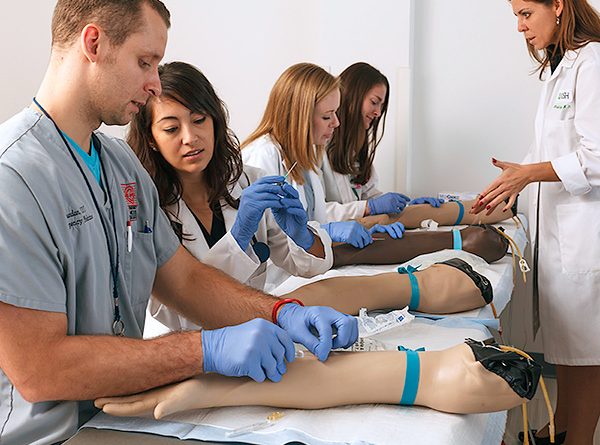How To Choose A Nursing Specialty
There are many advantages to becoming a nurse, and everyone will have their reasons for picking this particular profession. Something that excites nurses and future nurses is that there are so many different branches of nursing to explore. You could stay a generalist nurse and help in a number of different departments, you could become a nurse leader, or you could even specialize in a certain area, such as caring for children, working in the ER, or working in a ward caring for cancer patients, as well as a plethora of other specific departments.
If becoming a specialist interests you and is perhaps at least part of your reason for becoming a nurse, you’ll need to decide what specialty you want to study. Of course, this isn’t something you have to choose right from the start, but there will come a time when understanding what you want to get out of nursing will be crucial. With that in mind, here are some of the ways that can help you select a nursing specialty when that time comes.
Start At The Beginning
The first thing to do when it comes to picking the right specialty for you as a nurse is not to panic and not to rush. Start at the beginning of your nursing journey and move forward step by step slowly but surely – if you try to speed ahead, you’ll miss out on a lot, and you might not even make a very good start in the first place. Ultimately, rushing around and missing out could cause you hardships when pursuing your goals due to poor grades or lack of experience.
Start by concentrating on your initial nursing degree, and use this as the base point. If you really do want to get started more quickly, you can choose online ABSN programs. These are accelerated nursing programs that you can complete far more quickly than a standard program – plus, they are full-time, which means you can focus wholly on your studies and nursing career.
By giving your full attention to this first part of your course and then taking the time to work as a general nurse, you will experience the different areas of the hospital firsthand. Rather than just assuming you would want to work in one particular domain or another without experience, you’ll be armed with better knowledge that will help you choose which nursing path to take.
Even if you have worked in a generalized nursing position, you’ll have a greater ability to make a good decisionabout the next step in your nursing career as a result of your experience.Of course, you can always change your mind if you study a particular area that you find doesn’t suit you, but this will cost you time, money, and effort, so it’s best to get it right from the start. This is why taking your time, not rushing, and really getting to know the different aspects and branches of nursing as much as possible will pay dividends in the end.
Research Nursing Degrees
Once you do know what it is you want to specialize in, it is probable that you’ll need an additional degree or at least some certification to help you get there. Although experience is always going to be important, unless you have the degree to prove that you have the required skills and knowledge, you won’t be able to apply for a job and get on the career ladder.
Therefore, you’ll need to carefully research the different degrees that are available. You might go back to the school where you studied for your ABSN, BSN, or RN. Naturally, the positive of doing this is that you already know the system and you have achieved your original degree there, so you know how it all works.
However, if you want to make sure that you’re making the right choice, or if the school you originally received your nursing degree from doesn’t offer qualifications in the area you want to study, it’s worth checking out other options. Again, take your time here; it’s better to delay starting by a month or two than immediately choosing a college and not getting the education you need because you didn’t do enough research.
Take Some Time For Self-Reflection
You might think that this article is all about taking time and postponing the moment when you need to choose your specialty or start studying for it, and in some ways, there is truth to that. It’sso important to choose your nursing route wisely, especially if you want to turnthis rewarding profession intoa long-term career (as many people do, and this is certainly possible). Although no mistakes are undoable, wouldn’t it be better to make the right decision immediately?
This is why it is a good idea to think about yourself as well as your career. Start by remembering what it was that made you originally want to be a nurse. If you already know what you want to specialize in, this will help you ensure your choice will fit in with your ideals. In addition, in the case that you have no clue what specialty you wish to dive into, thinking about what made you choose nursing might help you narrow your options down.
For example, perhaps you went into nursing after you were in the hospital for surgery and found the nurses made a huge difference; in that case, you might want to explore OR nursing. Or maybe you love the idea of witnessing the miracle of birth,or you feel that it is end-of-life care that will allow you to help the most. No matter what interests and inspires you, you’ll be able to take the next steps toward making your dreams come true much more closely once you know where you will be best suited and what will allow you to attain your goals.
Identify Your Nursing Goals
When you know where your interests lie as a nurse, you need to think outside yourself. Self-reflection is the perfect start, but you then need to move on and think about the goals you have set for yourself (or should set if you haven’t already) in your nursing career. What exactly do you want to accomplish during your working life? This is a crucial question, and knowing the answer will certainly help you when it’s time to selectyour specialty.
Choosing your nursing path can seem like a daunting task to consider; after all, your healthcare career is probably going to be a long one, and there are plenty of different roads you can take. Trying to determine just where you want to be in the future is not easy, and asking yourself where you want to be in ten or even five years’ time might be impossible to answer.
The best thing to do is to break your nursing career goals down into smaller aims. You can then focus on each one, complete it, and move onto the next without becoming too stressed out. How can this help you choose a specialty? Well, as you take your larger, ultimate goal and split it into separate elements, you might find that you are drawn towards one particular type of nursing or a specialist area over and above anything else. Don’t fight against it if this happens, as it might be a great way to determine what your nursing career should look like in the future.
Focus On Self-Awareness
Another way to discover the ideal nursing specialty for you is to focus on your self-awareness. What is your personality type? What do you find enjoyable, and what makes you uncomfortable? For example, if you are an introverted kind of person, then it could be that face-to-face patient care is not the best field for you. Although many people will think of direct care when they imagine what a nurse does, there are several specialties that you can go into that remove you from having to workwith patients inperson.
Furthermore, a number of suchspecialist domains still allow you to help patients and put your nursing experience to good use; informatics and research are two fine examples. On the other hand, nursing specialties that involve dealing with patients directly on the front line of care will be a betteroption if you’re more extroverted and enjoy being in the presence of other people.
What if routine and shift work doesn’t suit you? In that case, don’t worry; you can still be a nurse if you work in a school or doctor’s surgery, where you’ll have predictable hours but may faceunique challenges to overcome. As a matter of fact, some people prefer shift work because it allows them more freedom and a better work-life balance (though this will depend on you, your personal feelings, and your life situation, of course). Should working in a more scheduled, regular way be preferable to you, then naturally, working in a hospital or clinic that’s open 24 hours a day, 365 days a year, might be the perfect choice.
In short, no matter your preferences with regards to how you work, what suits you best, and what you enjoy, there will be a branch or specialty of nursing that matches your interests, goals, skills, and lifestyle. You need to delve deep and understand what your personal aims, interests, strengths, and weaknesses are – and once you uncover them, you should be able to find the ideal match.
Consider Your Work-Life Balance
Something else you need to seriously consider when deciding which specialty you should choose as a nurse is your work-life balance. It’s so important to find this balance, as too much work can lead to burnout and stress (not to mention missing out on important life events and fun), whereas too much downtime can lead to falling behind in your career. There has to be equilibrium to ensure you can get as much fulfillment as possible fromboth your work and personal life, without either of them becoming too overbearing.
As a nurse, the work-life balance can sometimes be difficult to achieve, and it’s vital to know this from the start. Due to having to work nights, weekends, and holidays (as well as day shifts), finding the right balance could be tricky, to say the least. If you still wish to be a nurse but your nursing schedule simply doesn’t afford you a decent work-life equilibrium, you’ll need to search for a specialty that offers a better balance; one that allows you to work only during the week, or that entails no night shifts, for example.
It’s important to think carefully about what you want – not just out of your career but out of your life as a whole. What do you want from your life? What is your personal definition of the work-life balance? When you have figured this out, you’ll be able to ensure that the choice you make regarding your specialty matches how you want your life to look.
What Will You Be Paid?
In some cases, you’ll need to have a specific salary in mind – a minimum amount you will earn – to continue paying your bills and maintain your desired lifestyle. Ideally, when you specialize, you’ll earn more than you do as a generalist nurse; however, this is something to look more closely at before you make a decision. If the job you want to do pays less than your current post, is it worth it?
For many people,lower pay will not be an issue. Perhaps you’re not spending everything you earn, and you can afford to be paid less, for example. Alternatively, maybe you’ve just paid off a debt, so you don’t have to factor that into your outgoings anymore. However, if nothing has changed in your life and you need to have at least the same amount of money in the future as you do now, it’s wise to know this in advance before specializing in a field in which the pay is less.
It would be disappointing to find that you had done everything required and worked hard to advance your career only to find that all the jobs you can apply for offer lesser salaries than you need. Indeed, money isn’t everything, and it’s certainly not the main reason most people choose to go into nursing, but it is still important, and you need to be financially stable.




